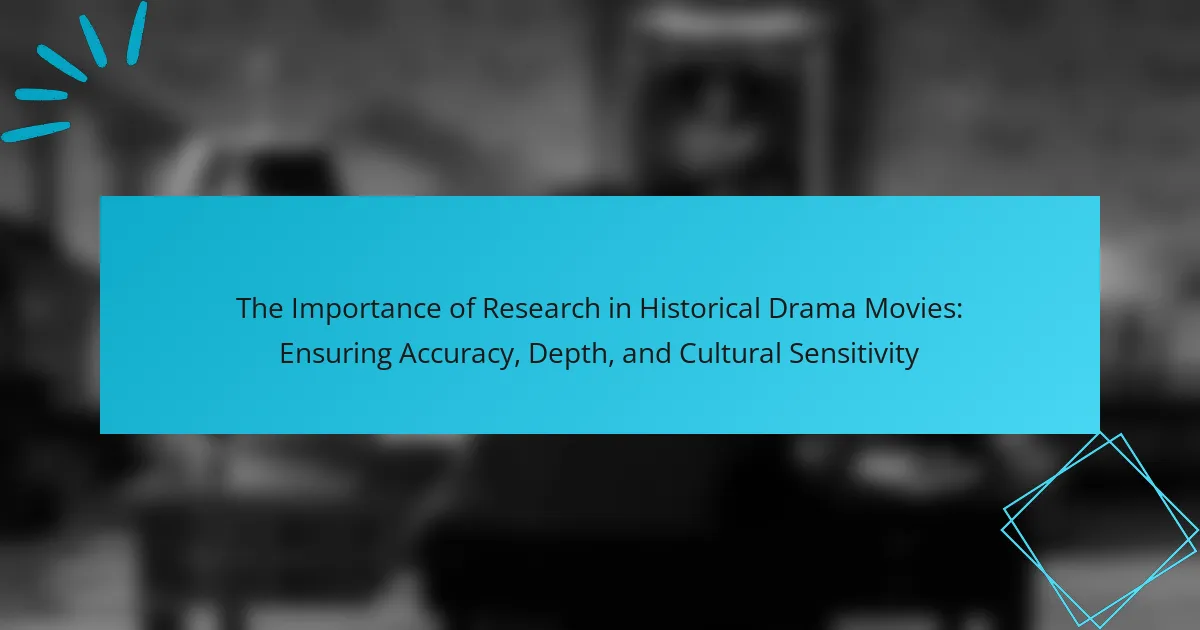
What is the importance of research in historical drama movies?
Research is crucial in historical drama movies to ensure accuracy and authenticity. Accurate portrayals of historical events and figures enhance the film’s credibility. Research helps filmmakers understand the cultural context and social dynamics of the time period depicted. It aids in creating realistic dialogue and costumes that reflect the era accurately. For example, films like “Schindler’s List” and “12 Years a Slave” relied heavily on historical research to depict real events and experiences. This thoroughness fosters a deeper connection with the audience. It also promotes cultural sensitivity by representing diverse perspectives and experiences accurately. Inaccurate representations can lead to misunderstandings and perpetuate stereotypes. Therefore, research is essential for creating compelling and respectful historical narratives.
How does research contribute to the accuracy of historical drama films?
Research enhances the accuracy of historical drama films by providing factual context and details. It helps filmmakers understand the time period, cultural nuances, and significant events. Research includes studying primary sources, such as letters and diaries, and secondary sources like historical analyses. This process informs character development and plot authenticity. For instance, the film “Lincoln” utilized extensive research on Abraham Lincoln’s life and political climate. This led to a portrayal that resonated with historical realities. Accurate representation fosters audience engagement and educational value. Therefore, thorough research is essential for creating credible historical narratives.
What specific elements of history require thorough research in filmmaking?
Key elements of history that require thorough research in filmmaking include historical events, cultural contexts, and character backgrounds. Filmmakers must accurately depict significant events, such as wars, revolutions, or treaties. Understanding the cultural context is essential for portraying societal norms and values accurately. Character backgrounds demand research into real-life figures, their motivations, and relationships. Additionally, filmmakers should investigate language, attire, and customs of the time period. Accurate representation of technology and architecture is also crucial. Researching these elements ensures authenticity and enhances viewer engagement. Historical accuracy can influence audience perception and appreciation of the film.
How does inaccurate representation impact audience perception?
Inaccurate representation negatively impacts audience perception by fostering misinformation. Audiences form beliefs based on the content they consume. When historical dramas present distorted facts, viewers may develop skewed understandings of events. This can lead to misconceptions about cultures and historical figures. Research indicates that audiences often accept dramatized portrayals as truth. A study by the American Historical Association found that 70% of viewers believe fictionalized accounts reflect historical accuracy. Misrepresentation can also perpetuate stereotypes, affecting societal attitudes. Overall, accuracy in representation is crucial for informed audience perspectives.
Why is depth essential in portraying historical narratives?
Depth is essential in portraying historical narratives because it provides a comprehensive understanding of events and their implications. Historical narratives benefit from depth by revealing the complexities of human experiences. This complexity allows audiences to grasp the motivations behind actions and decisions. For instance, the portrayal of World War II often includes diverse perspectives, highlighting the experiences of soldiers, civilians, and political leaders. Depth also fosters empathy, enabling viewers to connect emotionally with historical figures. Research shows that narratives with depth enhance viewer engagement and retention of information. A study by the National Endowment for the Arts found that deeper storytelling increases audience appreciation for historical contexts. Thus, depth enriches historical narratives, making them more informative and impactful.
What role does character development play in historical accuracy?
Character development significantly influences historical accuracy in drama movies. Well-developed characters provide context and depth to historical events. They help audiences understand the motivations and challenges faced by individuals in specific historical settings. For example, a character’s personal struggles can reflect broader societal issues of the time. This connection enhances the realism of the narrative. Moreover, accurate character traits and backgrounds rooted in historical research contribute to authenticity. Historical figures portrayed with attention to their true beliefs and actions maintain credibility. When character development aligns with historical facts, it enriches the storytelling experience while preserving accuracy.
How can research enhance the emotional resonance of historical dramas?
Research enhances the emotional resonance of historical dramas by providing authentic context and character depth. Accurate historical details allow for relatable and believable narratives. For instance, understanding societal norms of a specific era helps portray genuine emotions and conflicts. This authenticity fosters a stronger connection between characters and audiences. Additionally, research uncovers lesser-known personal stories that can add layers to the drama. Documentaries and historical texts serve as valuable resources for this purpose. By incorporating real events and emotions, the drama becomes more impactful. This approach can lead to a deeper viewer engagement and empathy towards the characters.
What is cultural sensitivity, and why is it crucial in historical dramas?
Cultural sensitivity is the awareness and understanding of the cultural differences and practices of various groups. It is crucial in historical dramas because these productions often depict cultures, events, and perspectives that are not the creators’ own. Misrepresentation can lead to stereotypes, inaccuracies, and cultural appropriation. Historical dramas impact public perception of cultures and histories. Accurate representation fosters respect and appreciation for diverse backgrounds. Researching cultural contexts ensures that stories are told authentically. For instance, films like “12 Years a Slave” received praise for their accurate portrayal of historical events and cultures. This highlights the importance of cultural sensitivity in creating meaningful and respectful narratives.
How does research help filmmakers navigate cultural complexities?
Research aids filmmakers in navigating cultural complexities by providing accurate context and understanding of diverse cultures. It ensures that filmmakers portray cultural nuances authentically. For instance, understanding historical events, traditions, and social norms helps avoid stereotypes. Research also informs dialogue, costumes, and settings, enhancing realism. According to a study by the University of Southern California, accurate cultural representation can improve audience engagement and reception. Inaccurate portrayals can lead to cultural misrepresentation and backlash. Thus, thorough research is essential for creating respectful and impactful films.
What are the consequences of cultural insensitivity in film?
Cultural insensitivity in film can lead to significant backlash from audiences and communities. It often results in misrepresentation of cultural identities. This misrepresentation can perpetuate stereotypes and reinforce harmful narratives. Audiences may feel alienated or offended by inaccurate portrayals. Such reactions can lead to negative reviews and financial losses for films. Additionally, cultural insensitivity can spark protests and calls for boycotts. It may also hinder the film’s ability to reach diverse audiences. Ultimately, this insensitivity undermines the film’s credibility and artistic integrity.
How can filmmakers ensure their research is comprehensive?
Filmmakers can ensure their research is comprehensive by utilizing multiple reliable sources. They should consult academic journals, books, and reputable websites. Engaging with experts in history and cultural studies enhances accuracy. Conducting interviews with historians provides unique insights. Filmmakers should also verify facts through cross-referencing. This method reduces the risk of misinformation. Additionally, exploring primary sources like letters and diaries adds depth. A thorough review of existing films on the subject can highlight common inaccuracies. By following these strategies, filmmakers can create historically accurate narratives.
What are common pitfalls in the research process for historical dramas?
Common pitfalls in the research process for historical dramas include oversimplification of complex events. This often leads to inaccurate portrayals of historical figures and their motivations. Additionally, selective sourcing can result in biased narratives. Researchers may focus on sensationalized accounts rather than balanced perspectives. Another issue is the reliance on outdated or discredited sources. This can perpetuate myths instead of presenting factual history. Furthermore, ignoring cultural context can lead to misrepresentation of customs and practices. Lastly, lack of collaboration with historians may limit the depth of understanding. These pitfalls can compromise the authenticity of the drama.

What methods can filmmakers use to conduct effective research?
Filmmakers can use various methods to conduct effective research. Primary methods include archival research, interviews, and field studies. Archival research involves examining historical documents, photographs, and other records. This method provides authentic context and details about the time period. Interviews with historians or experts can yield valuable insights and personal anecdotes. Field studies allow filmmakers to visit locations relevant to their story, enhancing authenticity. Additionally, filmmakers can utilize academic journals and books for in-depth analysis. Online databases and digital libraries also offer extensive resources. Combining these methods ensures a comprehensive understanding of the subject matter.
What resources are available for researching historical contexts?
Primary resources for researching historical contexts include archives, libraries, and museums. Archives hold primary documents such as letters, photographs, and official records. Libraries often contain extensive collections of books and journals on historical topics. Museums provide artifacts and exhibits that illustrate historical events and cultures. Online databases like JSTOR and Google Scholar offer access to academic papers and articles. Oral histories and interviews provide personal accounts of historical events. Documentaries and historical films can also serve as valuable resources for context. These resources collectively contribute to a comprehensive understanding of historical contexts.
How can primary sources enhance the authenticity of a film?
Primary sources enhance the authenticity of a film by providing direct evidence of historical events and contexts. They include documents, photographs, and artifacts from the time period depicted. Using these sources allows filmmakers to portray accurate details in settings, costumes, and dialogue. For instance, a script based on letters or diaries can reflect genuine emotions and perspectives. This attention to detail helps create a believable narrative. Films like “Schindler’s List” utilized survivor testimonies to convey true experiences. Such accuracy can foster a deeper emotional connection with the audience. Ultimately, primary sources contribute to a film’s credibility and educational value.
What role do historians play in the filmmaking process?
Historians provide critical expertise in the filmmaking process. They ensure historical accuracy in scripts and narratives. Their research informs character development and plotlines. Historians also verify the authenticity of costumes and settings. They help filmmakers avoid anachronisms and inaccuracies. Their work enhances the educational value of films. By consulting historians, filmmakers create more engaging and credible stories. This collaboration fosters a deeper understanding of historical contexts.
How can collaboration with experts improve film accuracy?
Collaboration with experts can significantly enhance film accuracy. Experts provide specialized knowledge that filmmakers may lack. This collaboration ensures that historical events and cultural contexts are portrayed accurately. For example, historians can verify timelines and events. Cultural consultants can offer insights into social norms and practices. Their input helps avoid misrepresentation and stereotypes. Films like “12 Years a Slave” benefited from expert collaboration, leading to a more authentic representation of history. Accurate representation fosters audience trust and engagement.
What are the benefits of consulting cultural representatives during production?
Consulting cultural representatives during production enhances authenticity and cultural sensitivity. Their expertise ensures accurate representation of cultural practices and beliefs. This reduces the risk of perpetuating stereotypes and misconceptions. Cultural representatives provide insights that enrich character development and storytelling. Their involvement can lead to a more inclusive narrative. Productions that prioritize cultural consultation often receive positive audience reception. This practice fosters respect and understanding among diverse communities. Ultimately, it contributes to the overall quality and credibility of the production.
How does feedback from historians shape the final product?
Feedback from historians significantly shapes the final product of historical drama movies. Their insights ensure historical accuracy and prevent anachronisms. Historians provide context that enriches character development and plotlines. They identify key events and cultural nuances essential for authenticity. Feedback can lead to changes in dialogue and setting to reflect true historical conditions. For instance, inaccuracies in costume design may be corrected based on historical evidence. This collaboration enhances the film’s credibility and educational value. Ultimately, historian feedback fosters a more engaging and truthful representation of history.
What are best practices for integrating research into the scriptwriting process?
Best practices for integrating research into the scriptwriting process include thorough documentation of sources. Writers should maintain an organized database of research materials. This helps in referencing facts accurately during script development. Collaboration with historians or experts enhances authenticity. Engaging with primary sources can provide unique insights into the period being depicted. Writers should also fact-check all historical details to ensure accuracy. Utilizing feedback from peer reviews can identify areas needing improvement. Lastly, revisiting research throughout the writing process ensures consistency and depth in the narrative.
How can screenwriters balance creative storytelling with factual accuracy?
Screenwriters can balance creative storytelling with factual accuracy by conducting thorough research on their subject matter. They should gather information from credible sources, such as historical texts and expert interviews. This research provides a solid foundation for the narrative.
Incorporating factual elements enhances the story’s authenticity. Screenwriters can blend real events with fictional characters or scenarios. This approach allows for creative freedom while maintaining a connection to reality.
Utilizing feedback from historians or subject matter experts can further ensure accuracy. Collaborative efforts can help identify potential inaccuracies. This practice fosters a respectful portrayal of historical events and figures.
Ultimately, screenwriters must prioritize factual integrity without sacrificing narrative engagement. This balance enriches the viewing experience and educates audiences on historical contexts.
What techniques can be used to weave historical facts seamlessly into dialogue?
Techniques to weave historical facts into dialogue include character-driven conversations, contextual references, and subtle exposition. Character-driven conversations allow characters to discuss historical events naturally. For example, a soldier might recount a battle, providing context without sounding forced. Contextual references can place historical facts within the setting, enhancing authenticity. For instance, mentioning a specific date or location can ground the dialogue in reality. Subtle exposition involves characters sharing knowledge in a way that feels organic. This might include a character explaining a historical significance during a relevant moment. These techniques ensure that historical facts enhance the narrative without disrupting the flow of dialogue.

How can audiences critically engage with historical drama films?
Audiences can critically engage with historical drama films by analyzing their representation of historical events. They should examine the accuracy of the depicted events against credible historical sources. Audiences can also consider the filmmakers’ choices in character development and narrative structure. This includes questioning how these choices affect the portrayal of cultural and social contexts. Engaging with reviews and critiques can provide additional perspectives on the film’s historical integrity. Furthermore, discussions with peers or participation in forums can deepen understanding and insight. By comparing multiple films on similar topics, audiences can identify biases or inaccuracies in storytelling. This critical engagement fosters a more informed appreciation of historical narratives in cinema.
What questions should viewers ask when watching historical dramas?
Viewers should ask questions about the historical accuracy of events depicted in the drama. This includes whether the timeline aligns with actual historical events. They should also inquire about the portrayal of key figures and their characteristics. Viewers can question if the cultural elements represented are authentic to the time period. Additionally, they should consider the sources used for the drama’s script and narrative. Questions about the motivations behind character actions can provide insight into the historical context. Lastly, viewers might ask how the drama addresses historical controversies or differing perspectives. These questions help assess the depth and cultural sensitivity of the portrayal.
How can understanding the research process enhance viewer appreciation?
Understanding the research process enhances viewer appreciation by providing context and depth to historical narratives. When viewers grasp how research informs storytelling, they engage more critically with the content. This engagement leads to a deeper connection with characters and events portrayed in historical dramas. Research adds layers of authenticity that enrich the viewing experience. For example, accurate depictions of historical events foster a greater respect for the subject matter. Viewers are likely to appreciate the effort behind the scenes, recognizing the dedication to factual representation. Research also promotes cultural sensitivity, allowing audiences to understand diverse perspectives. Consequently, informed viewers are more likely to discuss and reflect on the themes presented in the film. This reflection can lead to a more meaningful and impactful viewing experience.
What resources can audiences use to verify the accuracy of historical films?
Audiences can use academic journals, historical databases, and primary source documents to verify the accuracy of historical films. Academic journals often publish peer-reviewed articles analyzing historical events depicted in films. Historical databases like JSTOR or the National Archives provide access to credible historical records. Primary source documents, such as letters, diaries, and official records, offer firsthand accounts of historical events. Additionally, reputable history books authored by historians can provide context and analysis. These resources help audiences discern fact from fiction in historical narratives.
How can viewers differentiate between dramatization and factual representation?
Viewers can differentiate between dramatization and factual representation by analyzing the source material and context. Factual representations are based on verified historical events and documented evidence. Dramatizations often take creative liberties for narrative purposes. Viewers should check for citations or references to real events in the content. They can also compare the portrayal with established historical records. Recognizing the presence of fictional elements or artistic interpretations aids in this differentiation. Documentaries typically adhere to factual representation, while films labeled as “based on a true story” may include dramatized elements. Understanding the intent of the creators further clarifies the distinction between the two.
What practical tips can filmmakers follow to ensure quality research in their projects?
Filmmakers can ensure quality research by utilizing primary and secondary sources. Primary sources include letters, diaries, and official documents. Secondary sources involve books and articles analyzing historical events. Filmmakers should seek expert consultation from historians or cultural specialists. Engaging with communities related to the subject matter enhances authenticity. Cross-referencing information from multiple sources increases accuracy. Filmmakers must remain open to feedback and critique during the research process. Documenting sources properly fosters credibility in the project. These practices promote a well-rounded understanding of the historical context.
The main entity of this article is historical drama movies, with a focus on the importance of research in ensuring their accuracy, depth, and cultural sensitivity. The article outlines how thorough research enhances the credibility of films by providing factual context, informing character development, and accurately depicting historical events and cultural nuances. It discusses the consequences of inaccurate representations, the role of historians and cultural representatives in the filmmaking process, and best practices for integrating research into scriptwriting. Additionally, it emphasizes the need for audiences to critically engage with historical dramas to appreciate their complexities and verify their accuracy through reliable resources.
